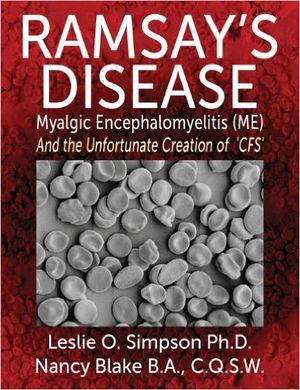Ramsay's Disease - Myalgic Encephalomyelitis (ME) and the Unfortunate Creation of 'CFS'
 | |
| Authors | Nancy Blake, Leslie Simpson |
|---|---|
| Country | United States |
| Language | English |
| Subject | Haematology, Psychiatry |
| Genre | Medical |
| Publisher | Lifelight Publishing |
Publication date | 2013 |
| Media type | print & digital |
| Pages | 224 |
| ISBN | 978-0957181724 |
Ramsay's Disease - Myalgic Encephalomyelitis (ME) and the Unfortunate Creation of 'CFS' is a book by author and former patient Nancy Blake and Dr. Leslie O. Simpson.
Publisher's synopsis[edit | edit source]
The contribution of haemorrheology to the understanding of and potentially effective treatment for the symptoms of ME (in its many aliases!) continues to be ignored by the medical profession, therefore unavailable to people who have ME. In ME, the high proportion of irregularly-shaped red blood cells which cannot traverse the microcirculation results in oxygen deficiency in muscles, the cognitive areas of the brain and the endocrine system. Fish oil, genuine EPO, Vitamin B12 as hydroxocobalamin, and pentoxyfilline have each been found to address this issue in a significant proportion of people with ME, very much improving their well-being.
In the meantime, the name-game rages, as psychiatry fights to maintain its current hold on the definitions and treatment recommendations for very sick and potentially disabled people. Complete rest right at the start gives the best outcomes; ME is defined by the fact that physical/mental exertion makes it worse. Yet, under the wide psychiatric umbrella of 'somatoform disorders' sufferers are assured that their illness is caused by paying too much attention to normal sensations, and that changing their 'false illness beliefs' and applying Graded Exercise Therapy will make them better. Politicians and the media enthusiastically and irresponsibly wave the flag for this point of view, while people with ME suffer the consequences.
Dr. Simpson describes his years of research and the history of the re-naming, while Nancy Blake, who ascribes her virtual recovery from ME to ruthless laziness and taking the supplements Dr. Simpson recommends, puts a strong case for a reversal of current policies to do with ME and disability. Which, she asks, will save the most money - letting people who have ME rest for six months, thereby setting the scene for (albeit protracted) recovery, or forcing them to exercise themselves into permanent disability?
Links[edit | edit source]
- Ramsay's Disease - ME and the Unfortunate Creation of 'CFS' - Amazon (US)
- Ramsay's Disease - ME and the Unfortunate Creation of 'CFS' - Amazon (UK)
- Ramsay's Disease - ME and the Unfortunate Creation of 'CFS' - Goodreads
See also[edit | edit source]
References[edit | edit source]

